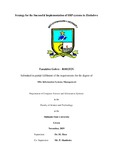Please use this identifier to cite or link to this item:
https://cris.library.msu.ac.zw//handle/11408/3752| Title: | Strategy for the successful implementation of ERP systems in Zimbabwe | Authors: | Gobvu, Tanatsiwa | Keywords: | Enterprising resource planning Business processes |
Issue Date: | 2019 | Publisher: | Midlands State University | Abstract: | Modern-day businesses have come to realise the importance of collaborating business processes and functional areas within an organisation. Enterprising Resource Planning (ERP) systems have been developed to fulfil that role - seamless integration of functional areas and business processes across departments of an organisation. In-line with understanding the indispensability of ERP systems, this study was dedicated to developing a strategy for the implementation of SAP ERP system in the context of State Owned Enterprises (SOEs) in Zimbabwe. Data was collected from ICT specialists and SAP users in the SOEs that have implemented SAP in Zimbabwe, ICT projects managers from both the SOEs and SAP implementing vendors or consultants. Quantitative data for the study was extracted from 66 SOEs’ employees (including ICT specialist, ICT project managers and super user) drawn from 15 sampled SOEs. Qualitative data was collected from 9 ICT project projects managers drawn from the SAP implementing companies. This therefore means that this study was both quantitative and qualitative premised on the pragmatist philosophy. The inductive approach was employed to ensure that the proposed ERP implementation strategy is developed after collecting empirical primary data. A basic descriptive survey design was employed in which questionnaires were distributed to SOEs employees. Interviews were applied for collecting data from the SAP implementing consultants. The quantitative data was analysed using SPSS version 20 and Microsoft Excel 2010 to summarise the statistical results in the form of tables, pie charts and bar graphs. Thematic analysis approach was applied to analyse the qualitative data. The collected empirical qualitative data was also used as corroborating evidence to the quantitative analysis results in the form of verbatim quotes extracted from the key informants. The research findings pointed to the following ERP implementation order of challenges: lack of sound technical support services, high SAP implementation costs, and technical complexity of the SAP ERP system, insufficient customised training, poor project management, unreliable ICT infrastructure, and reluctance by employees to adopt the SAP ERP system. The indicated top critical success factors included clear understanding of strategic organisation goals, commitment by top management support, excellent project management, competent implementation team, extensive education and training. The researcher developed an SAP ERP implementation strategy with the following critical components: Project Hand Over Protocol, document sign-offs, pre-sales activities, training, sound system configuration procedures, extensive system testing, a sound base ICT infrastructure, sound change management procedures, administration and support, proper project scheduling, key stakeholder involvement, reporting and analytics components, and an agile implementation methodology. The researcher recommended that careful consideration has to be done in developing a problem centred business case, assessing business needs, defining objectives and selecting a vendor in-line with tailored needs of an SOE. | URI: | http://hdl.handle.net/11408/3752 |
| Appears in Collections: | Master Of Science In Information Systems Management |
Files in This Item:
| File | Description | Size | Format | |
|---|---|---|---|---|
| Final Dissertation November 2019.pdf | Full Text | 2.15 MB | Adobe PDF |  View/Open |
Page view(s)
310
checked on Feb 26, 2025
Download(s)
250
checked on Feb 26, 2025
Google ScholarTM
Check
Items in MSUIR are protected by copyright, with all rights reserved, unless otherwise indicated.


